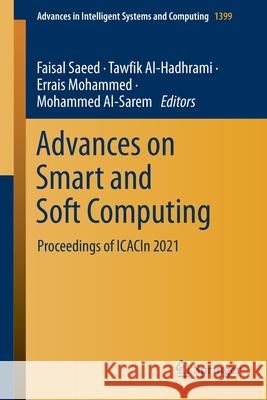Advances on Smart and Soft Computing: Proceedings of Icacin 2021 » książka
topmenu
Advances on Smart and Soft Computing: Proceedings of Icacin 2021
ISBN-13: 9789811655586 / Angielski / Miękka / 2021 / 680 str.
Kategorie:
Kategorie BISAC:
Wydawca:
Springer
Seria wydawnicza:
Język:
Angielski
ISBN-13:
9789811655586
Rok wydania:
2021
Wydanie:
2022
Numer serii:
000453356
Ilość stron:
680
Waga:
0.77 kg
Wymiary:
23.39 x 15.6 x 2.9
Oprawa:
Miękka
Wolumenów:
01
Dodatkowe informacje:
Wydanie ilustrowane











